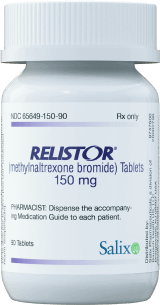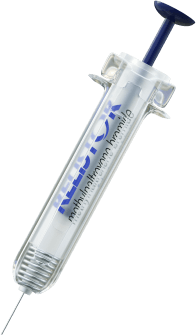
TABLETS

For adult patients with opioid-induced constipation and long-lasting (chronic) non-cancer pain.
Answer these questions to help start a conversation with your healthcare provider today. Check your gut ![]()
![]()
HOW DOES RELISTOR WORK?

Relistor is an FDA-approved prescription medication specifically for opioid-induced constipation (OIC) in adults with long-lasting (chronic) pain.
check RELISTOR
Available in two different formulations; tablets or a subcutaneous injection.




For adult patients with opioid-induced constipation and long-lasting (chronic) non-cancer pain.
Relistor may help increase the number of bowel movements you have each week*
Relistor may work within 4 hours*
Individual results may vary.
*Based on a clinical study of 401 adult patients with opioid-induced constipation (OIC) and long-lasting (chronic) non-cancer pain treated with Relistor tablets or placebo (sugar pill).


For adult patients with opioid-induced constipation and advanced illness or pain caused by active cancer and who need increases in their opioid dose for comfort care.
For adult patients with opioid-induced constipation and long-lasting (chronic) non-cancer pain.
Relistor injection may help increase the number of spontaneous bowel movements you have each week࠺
Relistor injection may work within 4 hours‡†
Some patients with OIC and advanced illness who have a bowel movement within 4 hours may do so within 30 minutes‡
Individual results may vary.
†Based on a clinical study of 312 adult patients with OIC and long-lasting (chronic) non-cancer pain treated with Relistor injection or placebo injection.
‡Based on a clinical study of 133 adult patients with advanced illness and OIC treated with Relistor injection or placebo injection.
∫In clinical studies, a spontaneous bowel movement was defined as a bowel movement without the use of a laxative in the previous 24 hours.
Relistor can cause serious side effects, including a tear in your stomach or the wall of your intestine, called a perforation; diarrhea that is severe or does not go away during treatment with Relistor; and opioid withdrawal symptoms including sweating, chills, diarrhea, stomach pain, anxiety, and yawning.
Tell your healthcare provider if you have any side effect that bothers you or that does not go away. These are not all the possible side effects of Relistor. You may have others.
In clinical studies, the most common side effects:


Formulations and Administration
Relistor comes in two different formulations - oral tablet and subcutaneous injection. Relistor is available for adults with OIC and long-lasting (chronic) non-cancer pain and is designed to help manage your opioid-induced constipation.
Relistor tablets should be taken daily, as directed by your healthcare provider. Even if you do not feel constipated, do not make changes to your medication schedule without talking to your healthcare provider.
Stop taking other laxatives before you start taking Relistor tablets. You may resume laxatives after 3 days if needed.
Take three 150-mg tablets, for a total of 450 mg each day, in the morning. It is important to take Relistor as prescribed by your healthcare provider, which is usually for the duration of your opioid therapy. Your doctor may change your dose if you have kidney or liver problems.
Relistor should be taken at least 30 minutes before eating your first meal of the day. Do not eat food right before taking Relistor.
Take Relistor with water.
Relistor subcutaneous injection should be taken as directed by your healthcare provider and should be kept at room temperature.
Relistor injection is injected under the skin of the upper arm, stomach-area (abdomen), or thigh. Do not inject at the same spot each time (rotate injection sites). Please see the Instructions for Use included in the accompanying full Prescribing Information.
For adult OIC patients with long-lasting (chronic) non-cancer pain
For adult OIC patients with advanced illness
Relistor injection is the only FDA-approved prescription medication to treat OIC in adult patients with advanced illness (eg, end-stage chronic obstructive pulmonary disease, or COPD; heart disease; Alzheimer's disease) or pain caused by active cancer and who need increases in their opioid dose for comfort care.
Stop taking Relistor if you stop taking your prescription opioid pain medication. Tell your healthcare provider if your pain medication changes.
It's important to take Relistor as prescribed by your healthcare provider
See the FAQs for RelistorRELISTOR® is a prescription medicine used to treat constipation in adults that is caused by prescription pain medicines called opioids.
It is not known if RELISTOR is safe and effective in children.
You are encouraged to report side effects of prescription drugs to FDA. Visit www.fda.gov/medwatch or call 1-800-FDA-1088.
For product information, adverse event reports, and product complaint reports, please contact:
Salix Product Information Call Center
Phone: 1-800-321-4576
Fax: 1-510-595-8183
Please click here for full Prescribing Information for RELISTOR tablets and RELISTOR injection, including medication guide.
Indications - RELISTOR® is a prescription medicine used to treat constipation in adults that is caused by prescription pain medicines called opioids.
It is not known if RELISTOR is safe and effective in children.
Important Safety Information - Do not take Relistor if you have a bowel blockage (called an intestinal obstruction) or have a history of bowel blockage.
You are encouraged to report side effects of prescription drugs to FDA. Visit www.fda.gov/medwatch or call 1-800-FDA-1088.
For product information, adverse event reports, and product complaint reports, please contact:
Salix Product Information Call Center
Phone: 1-800-321-4576
Fax: 1-510-595-8183
Please click here for full Prescribing Information for RELISTOR tablets and RELISTOR injection, including medication guide.
Do not take Relistor if you have a bowel blockage (called an intestinal obstruction) or have a history of bowel blockage.
You are encouraged to report side effects of prescription drugs to FDA. Visit www.fda.gov/medwatch or call 1-800-FDA-1088.
For product information, adverse event reports, and product complaint reports, please contact:
Salix Product Information Call Center
Phone: 1-800-321-4576
Fax: 1-510-595-8183
Please click here for full Prescribing Information for RELISTOR tablets and RELISTOR injection, including medication guide.